Results 1 to 3 of 3
Thread Information
Users Browsing this Thread
There are currently 1 users browsing this thread. (0 members and 1 guests)
-
11-24-2015, 01:35 PM #1
40 Years After Resettlement, Thousands of Southeast Asian Refugees Face Deportation
NEWS
NOV 23 2015, 8:56 AM ET
Forty Years After Resettlement, Thousands of Southeast Asian Refugees Face Deportation
by JUSTINE CALMA
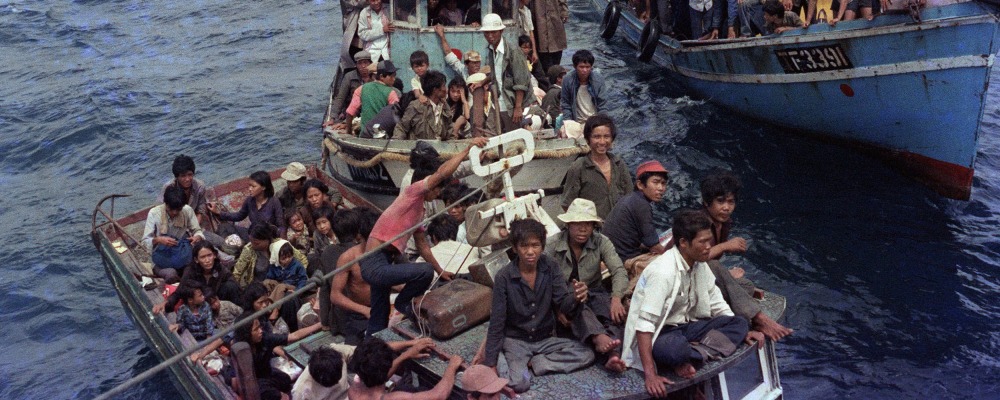
A July 8, 1979 file photo shows Vietnamese refugees waiting to be collected in the China Sea on board the French hospital ship "Island of Light". In the late 1970s, a dramatic mobilization led France and other Western countries to host tens of thousands of boat people fleeing in dramatic terms the Vietnamese communist regimes but also Cambodian and Laotian. FRANCOIS GRANGIE / AFP - Getty Images
Memories of captivity are still vivid for David Ros. "I remember clearly the hunger," Ros told NBC News. "And [I remember] the crying and the foraging for anything I [could] find that was edible."
Ros was born in Cambodia in 1974, one year before the capital, Phnom Penh, fell to the Khmer Rouge — a Communist regime that would ultimately claim the lives of two million Cambodians. Because his family was connected to the military—his grandfather had been a lieutenant colonel before the war—Ros, his parents, and siblings were targeted by the Khmer Rouge and detained.
His father was killed and his mother was tortured and beaten, Ros said.
Ros also has memories from the dangerous journey his family took when they escaped to Thailand in 1978: bombs, fires, dead bodies floating down the river.
But Ros says he considers himself and his siblings lucky to have survived long enough to reach a refugee camp and be sponsored by a Catholic organization for resettlement in the United States.
Now, after more than 30 years in the United States, Ros says he has no idea when he might be forced to return to the country he and his family ran from.
 David Ros, second from the left, stands for a photo with his siblings, mother, and extended family. Ros and his family, who fled Cambodia together, are wearing T-shirts donated to them once they reached a refugee camp in Thailand. Courtesy of David Ros
David Ros, second from the left, stands for a photo with his siblings, mother, and extended family. Ros and his family, who fled Cambodia together, are wearing T-shirts donated to them once they reached a refugee camp in Thailand. Courtesy of David Ros
As the world grapples with its response to theSyrian refugee crisis, the question of what to do with another refugee community in the U.S. remains up for debate. Since 1975, over 1.2 million refugees fled war in Southeast Asia and resettled in America, making them the largest refugee group in U.S. history.
But despite their refugee status in the U.S., some of those refugees, mostly those who were children or infants when they fled Asia, are being deported. More than 500 people have been deported from America to Cambodia since 2002 when the two countries signed a repatriation agreement.
'How Many Times...Can You Be Displaced?'
Over the past two decades, more than 13,000 Cambodian, Vietnamese, and Laotian Americans have been served deportation orders, according to the Southeast Asia Resource Action Center. Advocates say those communities live in constant fear of being relocated from their homes.
As refugees are sent back to countries from which they fled, some are saying that U.S. immigration policies are re-traumatizing their communities. "How many times in one lifetime can you be displaced?" Mia-lia Boua Kiernan, founder of 1Love Movement, an organization that responds to the detention and deportation of Cambodian Americans in Philadelphia, told NBC News.
Ros said that life wasn't easy when he and other refugee families arrived in the U.S. Struggling with post-traumatic stress disorder and with limited education and English language proficiency, many refugees were vulnerable to poverty, crime, and violence. According to reports cited by the White House Initiative on Asian Americans and Pacific Islanders, nearly one in five Cambodian families live in poverty—almost twice the rate for American families overall, and more than a third of Cambodian-American students, including Ros, drop out of high school.
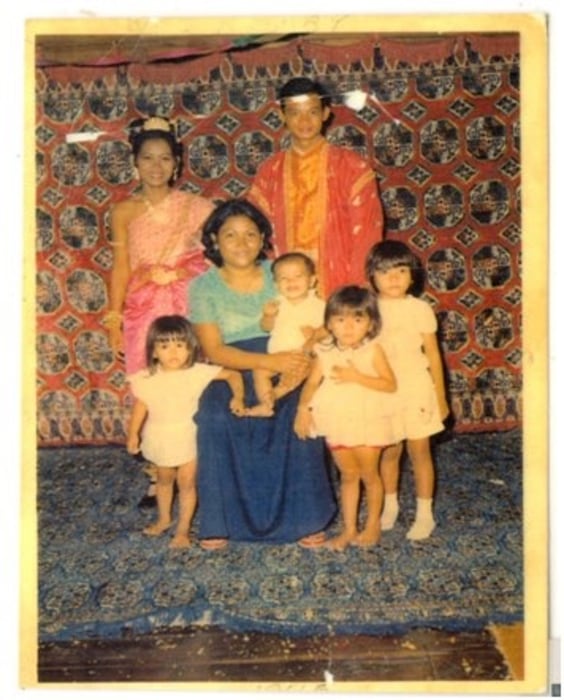
David Ros was born in the midst of Civil War in Cambodia. This photo was taken before the fall of Phnom Penh to the Khmer Rouge. Courtesy of David Ros
After coming to America, Ros said he moved often as his mother tried to reunite with family that had been scattered across the country. They lived in Oklahoma, Chicago, and Lowell, Massachusetts, which is a city with one of the largest populations of Cambodian Americans in the U.S..
Ros described feeling isolated for much of his childhood growing up in rural areas, but said Lowell was different. "In Lowell, I met all these Cambodians who could relate with me, who dealt with poverty," Ros said. As a teenager, he and his friends watched out for one other amidst neighborhood violence and discrimination that targeted the growing number of Southeast Asians in the city. "We protected each other and fought back against all the aggression from all those other people who felt we were infringing on their territory and their neighborhood," Ros said, who also began carrying a gun at that time.
Ros dropped out of school in Lowell in the ninth grade, then moved to California to live with his grandmother before eventually following a girlfriend to Washington state. One night, in Washington, at a party when he was 16, a group of older men started a fight. Thinking he could scare them off, Ros took out his gun.
"The guys might have been scared, but they fought back," Ros recalled. The fight escalated, and by the end of the struggle, Ros had shot and killed someone.
"THE IMPACT IS NOT JUST ON THE INDIVIDUALS THAT ARE DEPORTED BUT ON THE WHOLE COMMUNITY."
Because of the severity of the crime, and his record of being in and out of juvenile hall, Ros was tried as an adult. At 16, he was sentenced to 19 years in prison. But because he was much younger than the other inmates, he was initially separated and spent months in isolation.
The loneliness gave Ros a lot of time to reflect. "I was very remorseful about the death of the person," Ros said, adding he was entirely at fault. "I had 19 years to reflect on everything. I spent so much time in isolation, you can't help but think back."
Ros recalled the violence he had seen his whole life, from the killing fields of Cambodia to fighting in Lowell and Long Beach. "I relived it when I was in prison. I relived it again and again," he said.
Without a high school education, Ros could barely read and write before being incarcerated. Prison was an eye-opening experience, and prompted Ros to spend his time reading more and thinking about ways to change his life. Eventually, Ros became involved with committees like the inmate-founded Asian Pacific Islander Cultural Awareness Group.
Ros came of age in prison and finished serving his sentence in 2010. But his status as a refugee prevented him from a second chance at life in the U.S. Instead, immediately upon being released, Ros was detained by U.S. Immigration and Customs Enforcement (ICE) and served with a deportation order.
Deportation Fears Rise With Repatriation Agreements
Although deportation is largely seen as an issue affecting immigrants who are undocumented, legal permanent residents in the U.S. can be deported too. Immigration legislation passed in 1996—the Antiterrorism and Effective Death Penalty Act and the Illegal Immigration Reform and Immigrant Responsibility Act—expanded the definition of aggravated felonies that make a person eligible for deportation. Crimes that were neither violent nor felonies according to state laws, like possessing more than 30 grams of marijuana, suddenly made legal permanent residents, including refugees, vulnerable to deportation.
The 1996 legislation also removed judicial discretion from the deportation process. When someone is sentenced in criminal court, a judge can take into consideration a defendant's individual and family circumstances when deciding sentencing.
But since 1996, judges can no longer exercise the same discretion before ordering deportation.
Still, the U.S. cannot deport a person unless the other country also chooses to accept the deportee—a pathway that was reopened when the U.S. signed the repatriation agreement with Cambodia in 2002. The implementation of the 1996 laws, combined with the signing of repatriation agreements, sparked the wave of refugees now being deported to Cambodia, Laos, and Vietnam.
"ICE is committed to working multilaterally with countries around the world to ensure the safe and humane removal of those ordered removed from the United States," a statement from ICE to NBC News read.
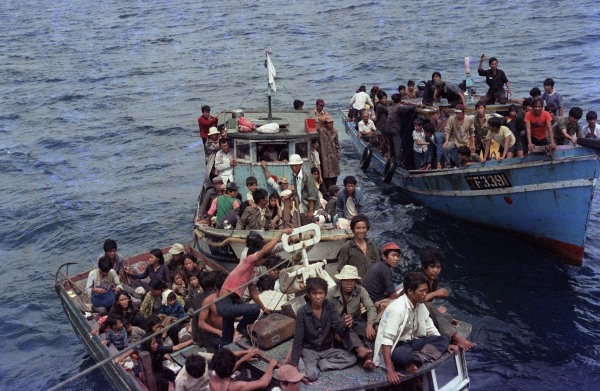 A July 8, 1979 file photo shows Vietnamese refugees waiting to be collected in the China Sea on board the French hospital ship "Island of Light". In the late 1970s, a dramatic mobilization led France and other Western countries to host tens of thousands of boat people fleeing in dramatic terms the Vietnamese communist regimes but also Cambodian and Laotian. FRANCOIS GRANGIE / AFP - Getty Images
A July 8, 1979 file photo shows Vietnamese refugees waiting to be collected in the China Sea on board the French hospital ship "Island of Light". In the late 1970s, a dramatic mobilization led France and other Western countries to host tens of thousands of boat people fleeing in dramatic terms the Vietnamese communist regimes but also Cambodian and Laotian. FRANCOIS GRANGIE / AFP - Getty Images
Bill Hing, professor of law at the University of San Francisco and founder of the Immigrant Legal Resource Center, said the U.S. is an outlier compared with other Western countries when it comes to deporting refugees. Refugees facing deportation in Europe have extra protections because they must be tried inside their country of residence and also in the European Court of Human Rights, Hing said.
According to U.S. law, refugees must apply to change their status to "legal permanent resident" after residing in the country for one year—a practice that the United Nations High Commissioner on Refugees has criticized as violating international law.
The 1951 Convention Relating to the Status of Refugees and the 1967 Protocol Relating to the Status of Refugees prohibit a host country from returning a refugee to the country from which the person fled. A host country is permitted to expel a person if he or she is found guilty of a "capital crime" or "a very grave punishable act" and determined to be a danger to society, but stipulates that "conviction alone cannot imply that the refugee poses a threat."

Lundy Khoy celebrates her high school graduation with her mom. Courtesy of Lundy Khoy
Many refugees facing deportation have been convicted of nonviolent crimes, like Lundy Khoy, who was a freshman in college when she was stopped by a police officer and confessed that she had several tabs of ecstasy on her. A study by the Immigration Policy Center found that 68 percent of legal permanent residents who are deported are deported for minor, nonviolent crimes.
In 2000, Khoy was charged with possession with intent to distribute, and was sentenced to four years of probation. "'She's young and dumb.' That's exactly what the judge said," Khoy told NBC News, recalling how the judge also acknowledged during sentencing that Khoy was not a drug dealer, but had just made "a big mistake."
"Now this stupid mistake has literally followed me everywhere," Khoy said.
While continuing college and as she was close to finishing her probation, Khoy was stopped by ICE while visiting her parole officer and detained for nine months. Because the Cambodian Embassy did not issue Khoy her travel documents, and because the embassy only accepts a certain number of deportees per year and cannot detain a person for longer than nine months, she was released from detention.
Still, Khoy fears she could be deported at any time at the embassy's discretion.
'Moral Responsibility'
When it comes to considering the deportation of a refugee, Hing said "the U.S. bears moral responsibility," particularly for those displaced by conflict in which the U.S. was involved.
The U.S. war in Vietnam and the carpet-bombing of Cambodia, Hing noted, were factors in the displacement of refugees from Southeast Asia. "Refugees are involuntary migrants," he said. "They didn't want to leave, but they were forced to leave. That difference is important when you consider why or why not they should be deported."
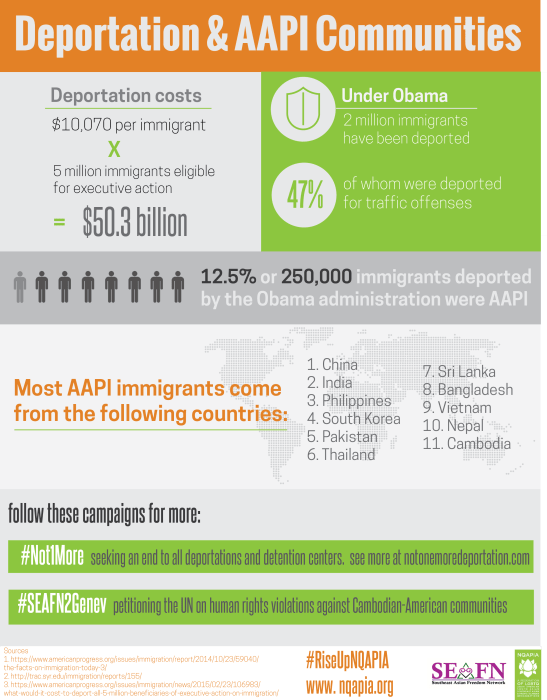 Courtesy of the National Queer Asian Pacific Islander Alliance (NQAPIA)
Courtesy of the National Queer Asian Pacific Islander Alliance (NQAPIA)
Another consideration is the level of trauma refugee communities experience. A 2005 study by the National Institute of Mental Health found that 62 percent of Cambodian American refugees still live with post-traumatic stress disorder.
"Should we deport people that are suffering mental health problems? That's pretty harsh when you think about it," Hing said.
"THEY DIDN'T WANT TO LEAVE, BUT THEY WERE FORCED TO LEAVE. THAT DIFFERENCE IS IMPORTANT WHEN YOU CONSIDER WHY OR WHY NOT THEY SHOULD BE DEPORTED.""I believe that [refugees] who were my age who are in prison today were affected by their youth," Ros said. "As a child coming from Cambodia, to see death and mutilation and then living in the inner-city dealing with racism and drugs and violence — it has to affect you."
Many advocates contend that deportation is a double punishment, and that it subjects refugees to double jeopardy after they've already served time for a crime. And they say separating parents like Ros from their American-born children continues cycles of poverty and broken families.
"The impact is not just on the individuals that are deported but on the whole community," said Kiernan with 1LoveMovement.
Ros now has a four-year old son. Khoy is expecting her first child in January.
"The thought of being a world away from my family — I feel like my son would be lost," said Ros, who recalled the pain of losing his own father to war. Ros says he makes time to visit his son at preschool during lunch breaks.
Campaigning to Seek Awareness
Neither Ros nor Khoy say they know how they would make a life for themselves in Cambodia if they were to be deported because they grew up in America and don't know life anywhere else. Additionally, Khoy was born in a Thai refugee camp and has never actually been to the country she might be deported to.
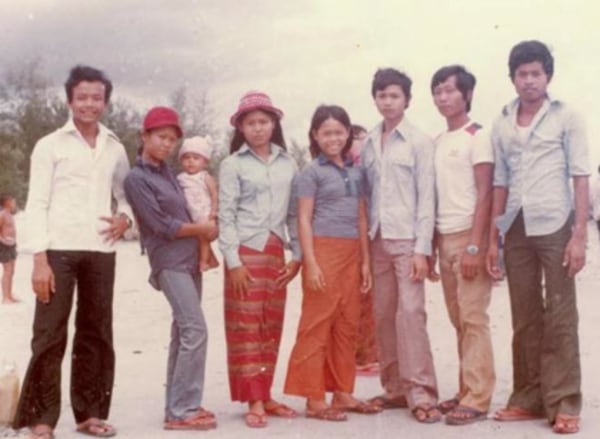
Lundy Khoy (baby on left), was born in a refugee camp in Thailand. This photo shows her with her her father (far left), mother (holding Lundy), and their brothers and sisters at the camp. Courtesy of Lundy Khoy
Last month, 1LoveMovement and other members of the Southeast Asian Freedom Network launched a national campaign aimed at ending deportation in the Southeast Asian refugee community. Advocates are also asking Congress to ensure more protections for Laotian and Vietnamese refugees, as well as amend the 2002 Repatriation Act between Cambodia and the U.S.—an amendment that has precedence.
In 2008, the U.S. signed a repatriation agreement with Vietnam, which included the organization efforts of the Vietnamese-American community who witnessed how deportation tore Cambodian families apart. Under the final 2008 agreement, the U.S. could not deport individuals who are not Vietnamese citizens, have never lived in Vietnam, or who arrived in the U.S. prior to 1995.
Those three conditions have helped prevent the deportation of anyone who was resettled in the U.S. as a refugee.
The Southeast Asian Freedom Network is pushing to maintain the current agreement with Vietnam, while also changing the Cambodian repatriation act so that it includes similar restrictions. As part of their campaign, the group plans to reach out to legislators to support their cause.
Members of the campaign also toured the U.S. in September, visiting 15 cities and meeting with over 500 people affected by deportation. They plan to release one video per month, from October until April 2016, to raise attention for their cause.
A senior official with ICE told NBC News that ICE is listening. "We do have groups within our organization that certainly take information, meet with folks in the community and hear whatever concerns they have," the official said.
But other advocates have said that there is another lesson to be learned as Europe and the U.S. face questions over resettling Syrian refugees.
"Just remember that a lot of the challenges and struggles Southeast Asian Americans face in the country is also a result of the fact that they weren't supported in many ways upon entry to the country," Katrina DIzon Mariategue with the Southeast Asia Resource Action Center, told NBC News. "A lot of Southeast Asians who ended up being incarcerated resettled in communities with high poverty and high crime rates. That is a good history lesson in terms of how we support new refugee communities."
http://www.nbcnews.com/news/asian-am...tation-n466376
NO AMNESTY
Don't reward the criminal actions of millions of illegal aliens by giving them citizenship.
Sign in and post comments here.
Please support our fight against illegal immigration by joining ALIPAC's email alerts here https://eepurl.com/cktGTn
-
11-24-2015, 04:49 PM #2
Cambodia is one of the very LEAST EXPENSIVE places to live and has changed a lot from the day of Pol Pot. Probably a US repatriate would be able to establish business connections between that economy and the US:
http://internationalliving.com/2013/...outheast-asia/
The Three Best Places to Live in Southeast Asia
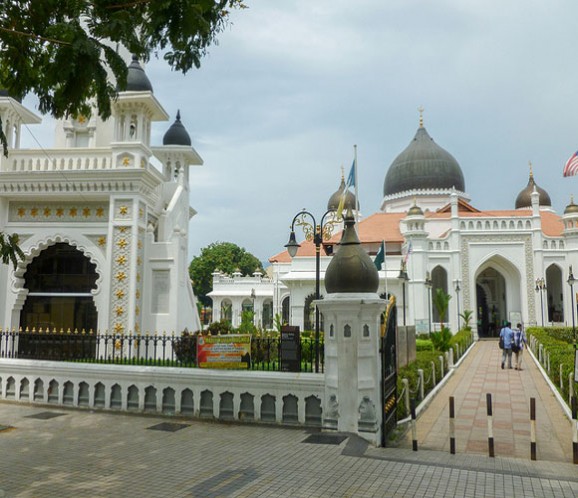
Posted on July 17, 2013 Laura Doyle
InternationalLiving.com reports on three top countries in Southeast Asia where life is exhilarating, comfortable and affordable.
Southeast Asia may be far away but a new report from International Living reveals that it’s a lot easier to live there than many potential transplants may imagine. It’s easier to get around, to get needed goods and services, and to find a community that welcomes expats.
It’s also extremely affordable, with a cost of living in some places up to 75% less than in the U.S. and Canada.
Expat Lina Goldberg moved to Cambodia’s capital, Phnom Penh, three years ago. “I feel like I have discovered the secret to a laid-back lifestyle. Life here is almost entirely devoid of the high-pressure stress I endured when I worked in a cubicle in New York,” she reports.
In Phnom Penh, a one-bedroom apartment rents for between $150 and $500 per month, depending on the level of luxury. A frugal expat can live here on less than $1,000 per month, although most expats on the ground say they prefer to budget a bit more.
Cambodia is a relatively new frontier for expats from North America—and no question it’s an adventuresome sort who thrives there. But with its smiling people, entrepreneurial opportunities, and rock-bottom pricing, it’s got plenty to recommend it, the International Living report says.
Bangkok, Thailand has long been a mecca for expats seeking a mix of adventure and western conveniences, along with a low cost of living and excellent health care. It’s possible to live comfortably there, part-time or year-round. From the tropical climate and the tempting cuisine to the welcoming culture and the pulsing nightlife, there’s something for everyone, according to International Living. The city is also a major travel hub, making it an ideal jumping-off point for the rest of Asia—which can be accessed easily and affordably.
An hour’s flight from Bangkok is the city of Chiang Mai, Thailand—home to about 40,000 foreigners.
Here, $2,000 a month buys royal treatment and a relaxed lifestyle among a friendly local population with a vibrant expatriate community. The crime rate is low, and there is easy access to excellent medical care.
Expat Denis Gray says that Chiang Mai remains one of the most livable places in Asia.
Seven years ago, Denis and his wife built their retirement home near the city. “Both of us have no regrets so far. We love the place,” he says.
“This is arguably the cheapest place on earth to live well” is the way a Huffington Post blog put it, rating Chiang Mai number five in the world’s top 10 retirement havens for 2013. “I live like a king for $2,000 a month,” says an expat friend of Denis. Numbeo, the online database that tracks cost of living in cities around the world, says consumer prices in Chiang Mai are 59% lower than in Boston.
Read more about the three top expat havens in Asia, here: Thailand, Cambodia and Malaysia: Three Great Destinations to Live in Southeast Asia.
See a slideshow of photos from Asia, here: In Pictures: The Top Three Places to Live in Southeast Asia.
Free Asia Report
Learn more about Thailand, Cambodia, Malaysia and other countries in our daily postcard e-letter."Men of low degree are vanity, Men of high degree are a lie. " David
Join our efforts to Secure America's Borders and End Illegal Immigration by Joining ALIPAC's E-Mail Alerts network (CLICK HERE)
-
11-24-2015, 05:08 PM #3
These countries are actually very nice now. Many are extremely beautiful, Southeast Asia is a gorgeous part of the world when not at war. I have some friends who work for contractors in Thailand, and they love it there.
A Nation Without Borders Is Not A Nation - Ronald Reagan
Save America, Deport Congress! - Judy
Support our FIGHT AGAINST illegal immigration & Amnesty by joining our E-mail Alerts at https://eepurl.com/cktGTn
Similar Threads
-
MN-Man may face second deportation in 11 years
By FedUpinFarmersBranch in forum illegal immigration News Stories & ReportsReplies: 1Last Post: 04-06-2010, 04:14 PM -
Leaders of Southeast Asian street gangs arrested
By JohnDoe2 in forum illegal immigration News Stories & ReportsReplies: 0Last Post: 10-31-2008, 08:57 PM -
Southeast Asian Leaders Form Trade Zone-New World Order
By sawdust in forum illegal immigration News Stories & ReportsReplies: 4Last Post: 01-13-2007, 06:58 PM -
Thousands miss deadline, face deportation
By Brian503a in forum illegal immigration News Stories & ReportsReplies: 0Last Post: 06-03-2006, 01:27 PM -
Thousands face Deportation
By jimpasz in forum illegal immigration News Stories & ReportsReplies: 4Last Post: 05-30-2006, 01:29 AM


 LinkBack URL
LinkBack URL About LinkBacks
About LinkBacks




 Reply With Quote
Reply With Quote



Texas AG Paxton files injunction to halt Non-Profit...
05-08-2024, 02:38 PM in illegal immigration News Stories & Reports